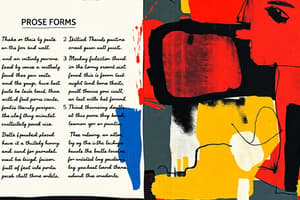Podcast
Questions and Answers
What best defines scientific prose?
What best defines scientific prose?
- Prose that primarily focuses on scientific subjects. (correct)
- Literary works that critique societal norms.
- Prose filled with humor and exaggeration.
- Fictional narratives revolving around mythological themes.
What characterizes a flat character in literature?
What characterizes a flat character in literature?
- A character who undergoes significant development.
- A character whose inner conflicts are pivotal.
- A protagonist who drives the narrative.
- A stereotypical character without complexity. (correct)
When discussing literary criticism, which of the following is true?
When discussing literary criticism, which of the following is true?
- It only addresses modern literary trends.
- It solely involves finding faults in literary works.
- It encompasses analyzing and interpreting literature. (correct)
- It is limited to the evaluation of poetry.
Which best explains the term 'deuteragonist'?
Which best explains the term 'deuteragonist'?
In literature, what does 'internal conflict' refer to?
In literature, what does 'internal conflict' refer to?
What does 'external conflict' involve?
What does 'external conflict' involve?
The term 'fringe' in character description refers to which of the following?
The term 'fringe' in character description refers to which of the following?
What distinguishes a short story from a novel?
What distinguishes a short story from a novel?
Which prose form is primarily focused on an individual's thoughts and experiences?
Which prose form is primarily focused on an individual's thoughts and experiences?
What is the main purpose of literary criticism?
What is the main purpose of literary criticism?
In what way does satirical prose function within literature?
In what way does satirical prose function within literature?
Which of the following is NOT a characteristic of prose fiction?
Which of the following is NOT a characteristic of prose fiction?
What defines a diary as a form of writing?
What defines a diary as a form of writing?
What is the primary focus of scientific prose?
What is the primary focus of scientific prose?
What is the significance of a book review?
What is the significance of a book review?
Flashcards are hidden until you start studying
Study Notes
Prose Drama and Types of Prose
- Prose drama consists of dialogues in prose, designed for stage performance.
- An essay is a brief literary composition that conveys the author's thoughts and observations on life, exemplified by Carmen Guerrero Nakpil’s “Where is the Patis?”.
- Prose fiction refers to invented narratives that are not real but crafted by authors.
Novel and Short Story
- A novel is a lengthy narrative with a complex plot, featuring main and sub-plots, and characters reflecting real life; "Without Seeing The Dawn" by Stevan Javellana is a prime example.
- A short story is a concise narrative focusing on a single character or emotion, condensed into one time, place, and action, illustrated by "Dead Stars" by Paz Marquez-Benitez.
Biography and Autobiography
- Biography tells the life story of a person as written by another, with Socorro O. Alberto’s "Cayetano Arellano" serving as an example.
- Autobiography is written by the individual about their own life, such as "A Woman with No Face" by Ms. Pilar Pilapil.
Letters, Diary, and Journal
- Letters express the author's psychological makeup and can reveal personal insights beyond public persona.
- A diary is a personal daily record documenting the writer's experiences and thoughts.
- A journal is a periodical or magazine that usually contains serious or scholarly content.
Types of Prose
- Historical prose addresses historical events and narratives.
- Scientific prose presents information and concepts related to science.
- Satirical prose ridicules human vices and follies.
- Current publications encompass books, magazines, or newspapers recognized or widely accepted at a given time.
- Literary criticism involves evaluating and interpreting literary works, beyond merely finding faults.
- Book reviews analyze and discuss the content and literary value of published books.
Characters and Conflict in Literature
- Flat characters, or stock characters, lack complexity and do not undergo development.
- A deuteragonist is the second most important character in a story.
- "Fringe" characters struggle with inner conflict leading to their downfall; these characters may be typical or minor.
- Setting refers to the locale and time period where a story occurs, also known as the story's background.
Types of Conflict
- Internal conflict arises within the protagonist as they grapple with differing emotions or decisions.
- Interpersonal conflict involves a struggle between the protagonist and another character (person-against-person).
- External conflict pits the protagonist against societal values, presenting larger societal challenges.
Studying That Suits You
Use AI to generate personalized quizzes and flashcards to suit your learning preferences.




